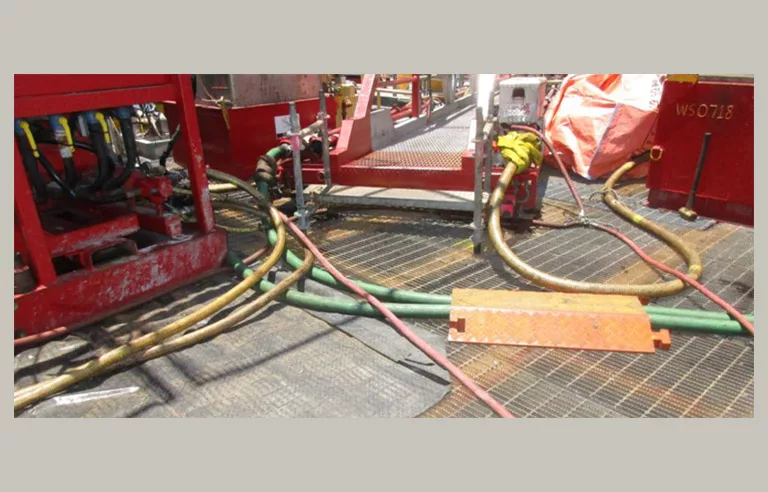
An example of tripping hazards aboard an offshore facility. Photo: Bureau of Safety and Environmental Enforcement
Washington — Offshore oil and gas operators and contractors should keep high-traffic areas clear of obstructions and safely maintained, the Bureau of Safety and Environmental Enforcement states in a recent safety alert.
BSEE, which oversees safety for the offshore energy industry, issued the alert amid a rise in injuries related to slips, trips and falls. More than 20% of injuries reported to the agency between May 2024 and this past April were attributable to slips, trips and falls, “surpassing lifting-related injuries for the first time in recent years.”
The injuries linked to slips, trips and falls frequently were severe and resulted either in three or more days away from work, restricted work, or job transfer. Further, a recent agency inspection of 19 production platforms and well operations found that formal training requirements or programs for preventing such injuries were minimal.
Additionally:
- Multiple inspections identified unguarded and sharp edges capable of causing cuts, lacerations, punctures and even amputations.
- Only one operator had evidence of a “start work check” that requires workers to clear paths and walkways before operations involving lifting, pumping, tubular handling and high-pressure testing.
- A lack of attention while walking was a common cause in multiple incidents.
The alert offers best practices for preventing slips, trips and falls:
- Emphasize the importance of remaining alert, especially in high-risk areas such as stairwells, decks and worksite exits.
- Scan your path for potential hazards.
- Require all offshore workers to wear appropriate foot protection and implement programs to ensure they inspect and maintain soles to achieve firm traction.
- Review work activities on all facilities and raise awareness of walkways with larger equipment, including generators, pumps, scaffolding and hoses.
- Identify sharp or unguarded edges during platform walk-downs and mitigate hazards if any are found.
McCraren Compliance offers many opportunities in safety training to help circumvent accidents. Please take a moment to visit our calendar of classes to see what we can do to help your safety measures from training to consulting.
Original article published by Safety+Health an NSC publication